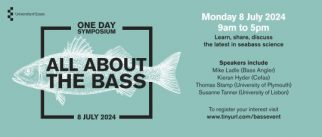Last year the Supper4Science project allowed anglers to be involved in a scientific research project looking at the link between bass spawning grounds and nursery areas. This summer the results will be presented and you can get involved, as Robin Bradley explains.
Anglers are passionate about their quarry, and have a fascination for them which goes far beyond just catching them. This fascination is coupled with a deep desire to see the continuation of their favourite species, for both themselves and for their childrenand grandchildren.
For many anglers, this passion and desire develops into a need to understand what makes their favourite species tick, and what happens to them during the various stages of their life cycle. Many ask ‘how can I get involved in research’ to increase understanding of these aspects, and in turn help to increase the prospects of catching more and bigger fish.
BASS has long supported research in bass biology. It has a dedicated science group to coordinate its involvement in this, and provide opportunities for members to get involved. The late Donovan Kelley and Graham Pickett, both members of BASS, contributed extensively to our understanding of many aspects of bass biology, including pioneering work on migration and nursery habitats. Members have collectively supported large-scale tagging projects, work on bass movements within estuaries and scale sampling.
A POWERFUL TOOL
Scientific data can be a powerful tool in helping to bring about management changes which benefit both fish stocks and those who exploit them, either recreationally or commercially.
Examples include increased protection of juvenile bass from fishing pressures in nurseries, stopping the annual slaughter of bass on their spawning grounds in winter by pair- trawlers, a closed period to protect bass while they are spawning (currently February and March) and the establishment of a minimum size to allow fish to reach maturity and spawn before being harvested.
Scientists at ICES (International Council for the Exploration of the Seas) carry out stock assessments each year to advise governments on the level of landings that can be sustained within given harvest strategies. But much more needs to be done, and we now have far better tools than past researchers had. We also need to understand and address anglers’ concerns about scientific research, and remove barriers to their involvement.
The behavioural patterns of fish, no doubt bass included, are changing as the seas warm around us. Modern research techniques such as electronic tagging and chemical analysis can provide mind-blowing information. Not only will this provide a greater understanding of the species, it will lead to better and more
focused protection.
BRINGING ANGLERS & SCIENTISTS TOGETHER
BASS’ recent involvement with research includes working with several universities on Fisheries Industry Science Partnerships
projects. One such project is ‘Supper4Science’, working with Essex University. This is looking at the connection between spawning areas and nursery grounds, and how related bass from different areas are. This research could have important implications for maximising the recruitment of bass to the fishery, and potentially for stock management.
The findings from this research will be presented at a symposium ‘All about the bass’ to be held at Essex University on July 8th. This event brings together scientists, anglers and policymakers to share, learn and discuss the latest in bass science.
We want to hear all your voices, insights and ideas. There will be a morning of talks and an afternoon of workshops, looking at such topics as bass movements and habitat needs across their entire life cycle, stock and fisheries management perspectives, as well as the impacts of climate change and their shifting distribution. We will discuss the more surprising places that bass are being found, as well how anglers can participate in science and policy change.
Registration will open in May and be on a first come first served basis. It’s free and includes lunch and refreshments. If you can’t attend in person, you can join us live online.
For more information, and to register your interest, visit: www.tinyurl.com/ bassevent or email c.connell@essex.ac.uk
